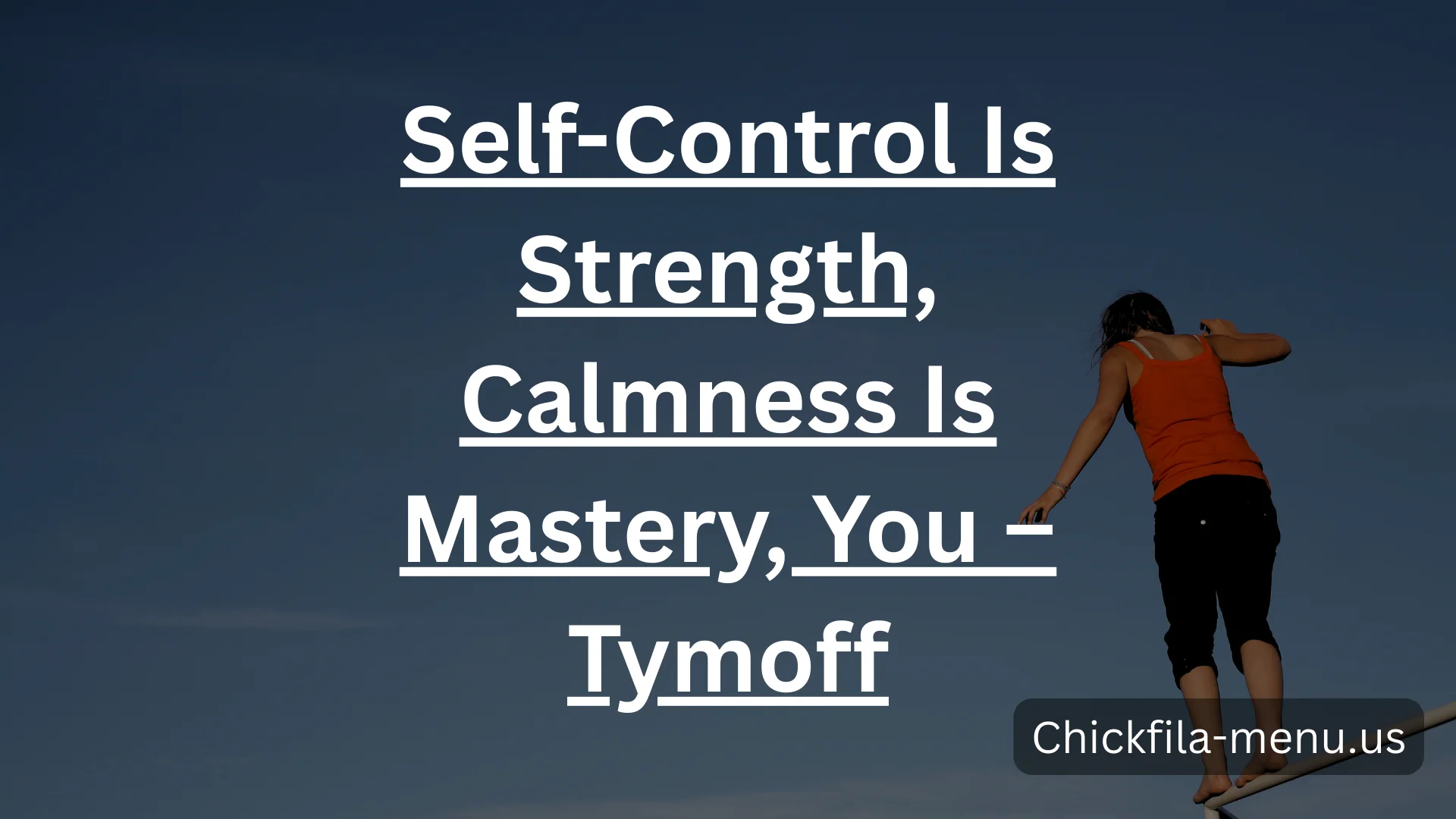Self-Control Is Strength, Calmness Is Mastery, You – Tymoff
In my search for positive motivation to guide myself on the path to serenity, we came across a powerful quote, “Self-control is strength. Calmness is mastery. You – Tymoff”.
Those who understand the importance of self-control and calmness will recognize the significance of this quote. These two traits hold great significance on their own, and the purpose of this article is to identify their relationship. At the end of this article, we will discuss some thought-provoking topics that will help us to master self-control
How do you define self-control or self-discipline?
While emotions will be covered in a separate article, self-control or self-discipline refers to controlling your inner feelings and emotions.
Without emotions, we would be nothing more than a programmed machine. Emotions allow us to connect with our loved ones and care for each other.
In addition to helping you understand the difference between morally correct and incorrect decisions, emotions make you more responsible. Imagining a world without emotions and feelings would be impossible, since our lives would have no purpose.
When we emphasize the importance of having these emotions, then why are we talking about controlling them? Our bodies have senses that let us know when something is pleasant and when it is unpleasant. A person’s ability to maintain self-control and self-discipline is a reflection of their ability to control their senses.
Our senses allow us to experience both good and bad things in life, developing our sentiments and emotions, which in turn give us a unique perspective on the world. As humans, we tend to hold onto happy experiences, not wanting to let them go, while rejecting bad ones, as they become beyond our tolerance.
Also check: XL NYT Crossword
When you are able to maintain emotional stability during happy times and keep striving in difficult times without losing hope, you have developed emotional self-control. A person with self-control or self-discipline controls their emotions and feelings under any circumstances, not letting them take control of them. This means listening to their minds rather than their hearts. Self-control means not letting your emotions take over you, which lowers your morale, and not letting them flow freely.

What is the importance of self-control?
1. Achieving goals
We can achieve long-term goals with self-control by keeping focused, resisting fleeting temptations, and ensuring our actions are consistently aligned with our goals. Staying steadfast on the path to success begins with self-control
2. Maintaining good health
The ability to control oneself has a significant impact on one’s health. It allows us to resist unhealthy habits, supports a balanced diet, encourages regular exercise, and fosters good sleep, thus promoting a healthy lifestyle.
3. Maintaining emotional balance
The ability to maintain mental equilibrium and boost our emotional health is impacted by self-control, which enables us to navigate through stress and emotional turmoil.
4. Relationships with others
When we maintain self-control, we improve the quality of our interpersonal relationships, helping to maintain harmony and respect between ourselves and others.
5. Confidence and self-esteem
As a consequence of exercising self-control, we gain a profound sense of accomplishment and self-esteem. By showing our capabilities and fueling our resilience, we are empowered to overcome future challenges with a sense of confidence in our ability to succeed
Self-control is Strength. Calmness is Mastery. You – Tymoff
Psychologist Roy F. Baumeister and Kathleen D. Vohs proposed the strength model of self-control in their study The Strength Model of Self-Control, which suggested that self-control can be fatigued over time through overuse, but can also become stronger with practice. Several studies indicate that self-control is crucial for managing food, drinking, spending, and interpersonal interactions. Developing self-control can be a challenge, but here are some tips that can help:
Keep your focus
The ability to focus is one of the most important things you can do in your life to establish self-control over your emotions. For instance, if you are not able to control your emotions, then you will have difficulty achieving your goals. You naturally eliminate all the distractions that prevent the achievement of your goals when you stay focused.
Distractions should be avoided
Distractions that weigh heavily on your emotions and sentiments should be avoided while exercising self-control. Try to divert your focus towards activities that make you more productive and focused, and avoid distractions that derail your focus. Whenever these distractions tempt you, have something that can make you pause and reconsider your decision.
Relax by meditating
A person often experiences emotional overflow because their minds are overflowing with various thoughts, which makes it difficult for them to focus on their goals. Due to this, many people may find it difficult to differentiate between right and wrong when their minds are occupied with too many things, and their emotions take over rather than their minds. Meditation helps you control your thoughts when your mind is occupied with so many things. In future articles, we’ll discuss this in greater detail.
Stay away from temptations
If you want to exercise self-control, avoid distractions or activities that could undermine it. The best way to do that is to force yourself not to do them or have someone who helps you resist the temptation. Those trigger points need to be avoided and you need to create a situation in which they are not present.
Build a strong mental foundation
The key to having a strong mind is practicing self-control. Engage in activities that strengthen your brain, challenge yourself with important tasks, and slowly increase the difficulty. To develop a logical, analytical mind that analyzes everything in detail, thinks multidimensionally and exercises your mind, it’s essential to set aside emotions
Make changes to your habits
The process of changing habits is very important to achieving self-control, since habits are part of our daily routine, which we follow consistently. When we become accustomed to something, it becomes hard for us to change. In order to achieve self-control, you must change the habits that keep you from exercising self-control. Create a schedule where you replace bad habits with productive ones.
Milestones should be set
The key to achieving self-control is not to work on it for a few days, then give up, but to achieve measurable milestones over time. You do not achieve self-control overnight, or even in a few months. It is important to set challenging milestones, and the difficulty level should increase gradually. When you reach a milestone, you should reward yourself, but do not let your emotions consume you. Instead, concentrate on preparing for the next one.
Educate yourself through reading
To achieve self-control, your mind needs to be enlightened. This can be achieved by reading and learning about things that will motivate you to control your emotions. Reading something can help us become more resilient. Self-control can only be made your strength when you learn it thoroughly, from the inside out. By eliminating distractions and gaining knowledge, you will be able to master it more easily
Make other things a priority
The reason we often fail to control our emotions is that we place more value on them than on other important things. When you lack self-control, a series of thoughts keep running through your head, consuming all your energy. When this happens, it is essential to prioritize other things that are important to you. Setting goals prevents you from getting distracted and keeps your attention on the task at hand
Benefits must be weighed
It is also important to consider both the pros and cons of self-control, and to identify role models who have achieved great levels of self-control. As your thinking begins to change, you will become motivated to attain self-control. When you are under the right influence, your grooming aligns in the same direction, and your mentality follows suit.

What is the strength of self-control?
The following are ten powerful reasons why self-discipline should be at the core of your strength:
1. Teaches patience
By controlling your emotions, feelings, and behavior, you automatically become more composed. This allows you to use your mind more than your emotions when making decisions. Therefore, you make decisions based on your thought process rather than your emotions.
2. Controlling your emotions and desires
It is a challenging task to manage emotions, but those who master it become strong as well as emotionally resilient. Our emotions can become substantial distractions during important moments in our lives. Despite their negative effects, if we learn to control our emotions, we can use them as a source of strength during tough times.
3. Increased focus
Controlling your emotions will increase your focus on your goals. You’ll be more able to deal with obstacles, distractions, and obstacles that come your way. The distractions disappear, and your attention shifts to priority items, which allows you to make better decisions.
4. Organize your priorities
A person who uses their head rather than their heart in life can prioritize things better. They realize the importance of time and where they need to be focused at any given time. Having self-control allows you to manage your emotions, allowing you to pay attention to things you may otherwise have overlooked.
5. Taking calculated risks
You become more logical and analytical when you start thinking logically and analytically rather than emotionally. By putting emotions aside and considering the situation from a multidimensional perspective, you are interested in understanding the situation. By doing so, you never make subjective or emotional decisions, but rather make calculated ones that support the best possible outcome.
6. Deals with stress effectively
Having control over your emotions makes it easier to deal with challenges, stress, and tension because you don’t allow your emotions to overflow. Self-control teaches you to act patiently and resist the temptation to make hasty decisions. Managing stress effectively and making the right decisions is easier when you have self-control, which keeps you calm and composed even in challenging situations
7. Be non-greedy
You don’t develop greed for anything when you have self-control and self-discipline. You manage your desires and don’t allow your emotions to overpower you. You live comfortably without luxuries. In addition to the basics, anything beyond those becomes a delight for you, and you learn how to live without them as well.
8. Improvements in health and well-being
Controlling your emotions significantly improves your mental health and emotional well-being. You handle all situations peacefully and calmly. Your stress levels are reduced, and you become well-prepared for anything. Focus remains strong on your goals, and distractions cannot easily distract you
9. Deal with challenging situations
Self-control helps you face challenging situations where it is crucial to use your mind more than your heart. When you have control over your emotions, you can think about dealing with the situation logically, which helps you brainstorm many ideas. By keeping your emotions in check, you can prepare for outcomes that you might not have considered otherwise.
10. Self-Regulation
Self-control teaches you to handle yourself in tough situations and move forward. It teaches that joy and sorrow are temporary and spending too much time on either is futile. It’s important to stay focused and progress towards your goals, rather than getting carried away by emotions in moments of happiness or getting too disheartened in moments of sorrow.
The Art of Emotion Control – Calmness is Mastery
The most important mastery is staying calm in chaotic situations. We often hesitate in tough situations, and in our anxiety, we make mistakes that make things worse. Researchers Juan Xi and Matthew T. Lee report in Inner Peace as a Contribution to Human Flourishing: A New Scale Developed from Ancient Wisdom that inner peace is beneficial to religious and secular individuals alike.
Sikka Pillerin of Stanford University conducted a study on Individual differences in peace of mind reflect adaptive emotion regulation, which indicates that individuals with adaptive emotion regulation skills enjoy higher levels of peace of mind. Hence, a calmer mental state reflects personal mastery when emotions are managed effectively.
Here’s a quick tip:
The most important skill is the ability to practice calmness, which should be a life goal of every individual.
Calmness: what is it?
You attain mastery of calmness when you are so skilled at controlling your emotions that you never let them overwhelm you.
The moment you get caught up in a situation that goes against you, you slowly start losing your patience. In such a situation, you will lose your patience completely, causing you to lose your temper. There will be no way to control the situation after that, and you won’t know what to do next. One thing is certain, it will only get worse, not better.
As a result of our emotions overpowering our thought processes, we often make errors in tense situations, as we are not fully utilizing our brains. Things are more likely to get worse in such situations.
If you remain calm in challenging situations and do not allow your emotions to overtake your mind, you can successfully address difficult situations.
When you master self-control, you gradually master calmness because as you learn to control your emotions, your level of calmness gradually improves. Essentially, the more you practice self-control, the more you master calmness. It is therefore very important to understand this interrelationship between self-control and calmness.
Similarly, you can relate the feeling of calm to meditation. Meditation involves letting go of all the thoughts running through your mind and focusing only on your breath. You gradually shift your focus from your breathing to other parts of your mind and body, and the many thoughts in your mind gradually disappear, leaving you at peace.
Similar to this, in a tense situation, thousands of thoughts and emotions are triggered in your mind, but you learn to control them to the point where they become as insignificant as a small amount of stress, and you are able to use your entire brain to resolve the problem logically and tactfully. Using this method, you will be able to find a solution-oriented outcome for any situation, which will allow you to focus all your energy on one thing at a time.
Calmness: How Do You Master It?
There’s nothing more important than how you reach this greatness, right? How do you master calmness? If you follow the tips below, you’ll be able to achieve it at the highest level.
Practicing meditation
The most effective method of mastering calmness is to meditate. As explained earlier, during meditation, you focus on only one thing at a time, which encourages other thoughts to fade away, allowing you to feel calm and composed.
Here’s a quick tip:
Meditating for 15 minutes during the day has the effect of increasing self-awareness and reducing emotional reactivity, which enhances emotion regulation.
Getting enough sleep
It’s quite obvious that when sleep is disrupted, irritability is inevitable. Proper sleeping habits are the first step to mastering calmness.
Here’s a quick tip:
Make sure that you get at least seven to eight hours of sleep a night and avoid using electronic devices at least half an hour before bedtime and after you wake up. Our recommendation is to take a short walk after dinner to clear your mind.
Dietary Guidelines
Maintain a healthy diet by removing foods that increase cholesterol and blood pressure. Eat all vegetables but only as much as you need. Avoid overeating and remember to eat to live, not to live to eat.
The exercise
When you set a schedule and exercise daily, discipline will automatically come to you. Exercise does not only mean building muscles, but also staying fit and healthy. You should run at least 1 km every day to achieve calmness. Runners push themselves beyond their potential and learn to balance their minds.
Get in touch with nature
Connect with nature. Take a stroll before sunrise and enjoy the peacefulness of the morning. Listen to birdsong and soak in the sun’s gentle rays. Enjoy the beauty of nature while planning your day during this time for yourself in the morning.
Don’t expect anything
Don’t expect anything from anyone. When you have expectations, you often experience disappointment, and experiencing disappointment can lead to an outburst of emotions. You should not allow yourself to be disappointed. Keeping your eyes on your goal is more important than thinking about what will happen in the future.
Get in the habit of forgiving others
It’s a good practice to forgive others and move on; there is no benefit in holding grudges. An emotional outburst trapped inside of you can be released by forgiving others. Forgiveness is the key to moving on in life. Forgiveness makes you feel lighter and gives you the freedom to live calmly without holding anything against another person.
Let Go and Let God
It’s important to understand that holding on to things without reason won’t bring you any benefits; it only increases your stress and leads to disappointment. The key to calmness is reducing stress and tension levels. The more grudges you keep in your head, the more likely you are to experience emotional outbursts in the future.
Become knowledgeable
Definitely. Continue learning every day and keep your curiosity alive. Knowledge is power, happiness, and a way to master calmness. Show interest in things that will improve your life. No matter how small or large your task may be, you should approach it with dedication.
Kindness is important
Be a good person and treat others well. You shouldn’t expect that people will treat you the same way when you treat them well. Not everyone is the same. To achieve mastery in calmness, everyone needn’t have the same intention. Be respectful of all living beings, whether they are animals or humans. Be patient and appreciate the beauty of creation.
Conclusion
Self-control is strength. Calmness is mastery. When you have self-control you are internally strong and emotionally stable. Self-control isn’t just about controlling your emotions, but also using them to build your power. The highest level of self-control is achieved through calmness
Meditation is the most efficient and effective method for improving self-discipline, as it teaches you how to focus. In the end, self-discipline teaches patience, enables you to concentrate, improves health, and helps you deal with stress more effectively.
It’s a beautiful interrelation between self-control and calmness when you start mastering yourself. Subscribe to Synched Harmony today for inspirational and motivational content.

John Quinn is a seasoned writer specializing in finance, cryptocurrency, and related industries. With a keen eye for market trends and a deep understanding of digital assets, he delivers insightful content that helps readers navigate the complexities of traditional and decentralized finance. Through his writing, John aims to educate, inform, and empower readers to make confident decisions in an ever-evolving financial landscape.







